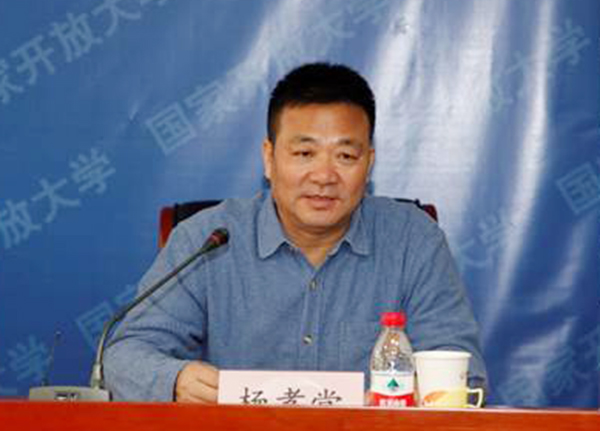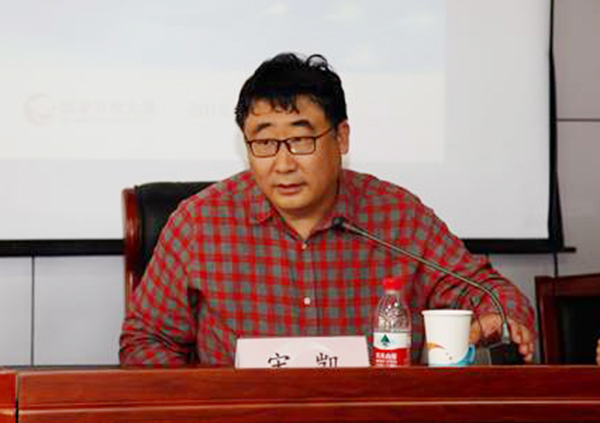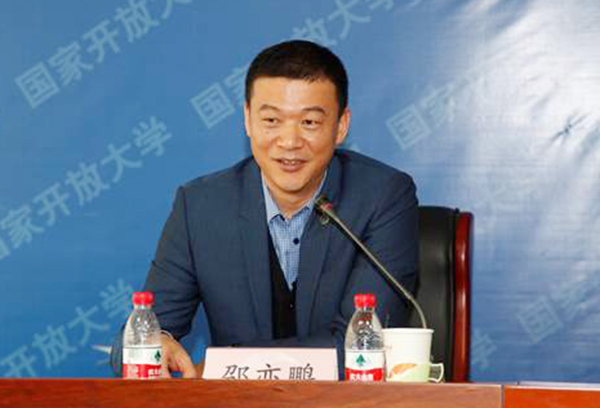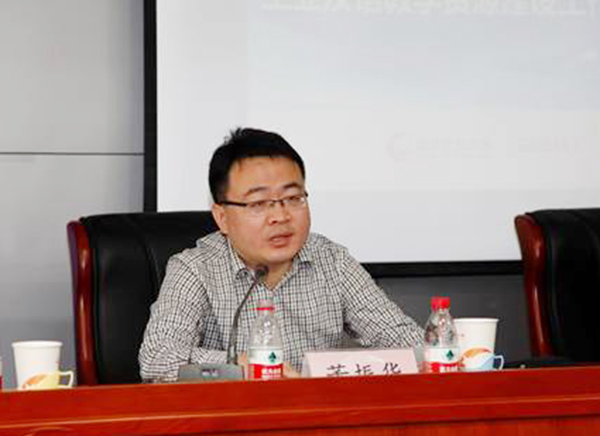 On 1 November 2019, the Open University of China (OUC) and the China Nonferrous Metal Industry Talent Centre (CNMITC) jointly organised and held a meeting to promote the construction of industrial Chinese teaching resources to help vocational education "go global.”
On 1 November 2019, the Open University of China (OUC) and the China Nonferrous Metal Industry Talent Centre (CNMITC) jointly organised and held a meeting to promote the construction of industrial Chinese teaching resources to help vocational education "go global.”
The meeting aimed to promote the pilot work of helping vocational education to go global initiated by the Ministry of Education (MOE); strengthen the overseas operation of the OUC, explore the new teaching format of "Chinese + Industry”; enrich the content available at the learning centres jointly constructed by the OUC with overseas Chinese enterprises; cultivate technical and skilled personnel for Chinese enterprises that are "going global,” as well as the countries along the Belt and Road Initiative; and explore an integrated talent training model for vocational and continuing education.
A total of 63 people, including Dong Zhenhua, deputy director of the comprehensive reform sector of the MOE’s Department of Vocational and Adult Education; Yang Xiaotang, vice president of the OUC; Song Kai, deputy secretary of the Party Committee and deputy general manager of the CNMITC; Shao Yipeng, director of the Teaching and Resources Department of the Confucius Institute Headquarters; Liang Chimin, dean of the China-Zambia Vocational and Technical College; heads of relevant departments of the OUC; and leaders and teacher representatives from 21 domestic vocational colleges and universities and OUC branches attended the meeting.

Yang Xiaotang discussed the achievements of the pilot work and introduced the practice and exploration of the OUC, one of the earliest units involving in the design and planning of the project, in terms of international development and overseas school running. The OUC Learning Centre in Zambia, the first overseas learning centre of the OUC, was first established in October 2017 on the basis of the Chinese Vocational Education Going Global Pilot Programme, which has achieved good results. In the future, the OUC will continue to explore and deepen overseas education in Tanzania, Pakistan, Papua New Guinea, Indonesia, and other Southeast Asian countries, and strive to make breakthroughs in terms of cooperation model, teaching model, resource construction, system construction, and degree cooperation policies.

Song Kai introduced the general situation of the pilot work of promoting vocational education “going out" in the non-ferrous metal industry. Taking the importance of non-ferrous metals as part of national strategic resource security as a starting point, he introduced the original intention, advantages, and significance of carrying out the pilot work of the Vocational Education Going Global Programme in the industry, as well as the actual results of employee training, the development of professional standards, organising overseas students to study in China, and the establishment of Confucius Classrooms and overseas learning centres. In the future, multi-language industrial Chinese teaching resources for different kinds of jobs will be developed by working out an industrial Chinese teaching resources construction plan in order to further cultivate a number of highly skilled professionals who "understand Chinese and Chinese culture and have mastered certain skills.”

Shao Yipeng introduced the work of the Confucius Institute and the basic situation of its overseas establishments, and put forward two suggestions for the development of industrial Chinese teaching resources. The first is to strengthen top-level design and formulate a development plan for industrial Chinese teaching resources. The second is to strengthen cooperation with more "going global" Chinese enterprises, jointly enhance the soft power of Chinese culture, bring together the strength of all parties, and support and join hands with them to promote Chinese culture.

Dong Zhenhua proposed that we should further improve the system, mechanism, and management model, establish working processes for planning, implementation, and evaluation, and develop e-learning resources by using information technology. The headquarters of the Confucius Institute has rich experience in the development of teaching resources, so it is necessary to strengthen its guidance and support for the development of industrial Chinese teaching resources in vocational education. The OUC should give full play to its advantages in distance education and information technology, deepen international exploration, and help cultivate overseas talents who understand and are friendly with China. He said that in the near future, the state will hold a forum on using vocational education to serve the construction of the Belt and Road Initiative with vocational education, in order to explore the major development of vocational education.
Liang Chimin said that at present, "going global" enterprises have an urgent demand for Chinese training for local employees, that the market for industrial Chinese training has great prospects, and that there is an urgent need for appropriate Chinese language teaching resources. It is hoped that the compilation of teaching materials can be combined with the language teaching system and that different levels of teaching materials can be developed, so as to create multi-language industrial Chinese teaching resources for different types of jobs for more "going global" enterprises.
Liu Jianguo, President of Harbin Radio and Television University, and teachers from relevant departments of the OUC shared their experiences of the construction of industrial Chinese teaching resources. During the meeting, the Work Plan for Industrial Chinese Teaching Resources Construction for the Vocational Education Going Global Programme (2019-2021) (Draft for Comments) was reviewed and the future tasks for industrial Chinese teaching resources development were deployed. The participants and experts discussed issues related to the compilation of industrial Chinese textbooks.
The MOE Chinese Vocational Education Going Global Pilot Programme has been taking place in the non-ferrous metal industry since the end of 2015. Prior to the inauguration of the OUC Learning Centre in Zambia in 2017, in order to meet the needs of teaching resource construction, the OUC researched and developed 100 Sentences for Industrial Chinese for the three specialties of Welding, Mining and Metallurgy, and Maintenance. After that, the MOE Department of Vocational and Adult Education entrusted the OUC to explore the "Research on Policies for the Reform of Majors for Vocational and Continuing Education" and to act as one of the units leading the organisation of relevant units to prepare learning materials and other resources. The OUC’s work has helped with the formation of industrial Chinese teaching resources for different levels and requirements.
By You Lina,OUC